Two Programs Can Coexist, Say Officials
By Darvi Brooks
The African American Leadership Institute (AALI) and the Colorado Black Chamber of Commerce (CBCC) are polishing individuals to become successful leaders, but especially to recognize that the seeds of success are harvested in the planting itself. AALI has offered their adult leadership program since 1990 and, with the graduation of their current class in November, will have produced 191 leaders. The Chamber Connect leadership program was launched this year and will graduate its inaugural class this month.
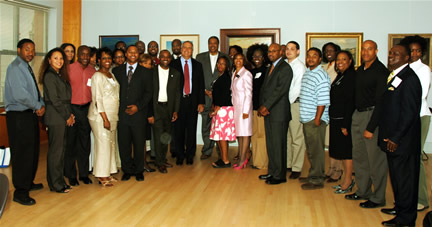
Chamber Connect Leadership Program participants with special guests
While offering different journeys, the basic goal is the same. Both organizations aim to produce well-rounded individuals, who can individually and collectively propel the positive influence and growth of the African-American community in Denver. Both staffs aspire for Denver to be further established and maintained as a viable city for African Americans to reside and thrive.
The programs have similar components, such as networking opportunities with established business professionals and a group service project, but several differences between the two programs mean the experiences can be complementary. Leaders of both the Leadership Institute and Chamber Connect believe their programs can coexist and contribute side-by-side to developing evolved, prepared leaders.
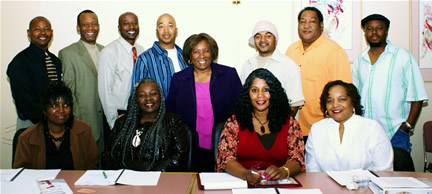
African American Leadership Program participants with director Linda Williams (back row, center). Photo by Foto Fabulous.
AALI President Linda Williams says, “When you think of the influence that the Black Chamber has and the heart that the Institute has, both relative to leadership, there is a wonderful potential for meeting the needs of our community. We have the potential to make the change in the community at large that is necessary for our economic and educational growth, relative to young people, to our health care and to training future leaders relative to our political and governance arenas.”
Former Mayor Wellington Webb, now president and CEO of the chamber, says “The program we provide is a little more business-specific, but if one were able to go through both programs, it would only make them better.”
“You always have to work to improve, whether it’s in a leadership program, networking, building your business…smart people all know that they can always learn more,” Webb says.
“The goal of the Colorado Black Chamber is to serve the needs of Black-owned businesses by providing economic opportunity and to support those businesses and the communities they serve. The Chamber Connect program is a sweet complement to that mission, in that it develops and enhances tailored professionals who are postured to invest value in the Denver African-American community,” he explains.
Candidates must apply and be accepted into the 10-month chamber program. Classes meet twice a month after business hours. Study topics include economic development, avoiding business failure, and Internet marketing.
“We know that there is definitely a need for this type of leadership development in this community based on the number of applicants. This year, the program had 60 applicants but only 30 were accepted. Not everyone will get in,” says Angela Williams of Allstate Insurance Company, who is a CBCC board member and Chamber Connect co-chair.
Allstate is the program’s corporate sponsor, and individual classes are supported by day sponsors, which provide marketing materials and various opportunities.
“Efforts to put more African-American professionals and civic leaders in the pipeline are greatly needed,” Williams says. “Denver is a very transitional city for African-American professionals … We hope that through this program, we can help make Denver a viable city and that African-American professionals will stay in the city.”
Richard Lewis of RTL Networks, another CBCC board member and the other Chamber Connect co-chair, says, “Half of the class is accomplished entrepreneurs, and the other half is in corporate America and have been identified in many cases by their companies as individuals who should be put on the fast track to management.”
Successful applicants to the inaugural class include Onyi Ejiasa (pronounced Oh-nee Ah-gee-ah-sa), a senior networks and systems administrator for Evergreen Energy, Kymbal Lindsay, a senior process analyst at Qwest, and Eno Ocansey (pronounced In-no O-con-see), an investor accounting specialist with Aurora Loan Services.
“The program, for the most part, has helped mold me into being a better business woman. It allowed me to meet different people, network amongst young Black professionals, and meet the elders in the community who are doing something,” says Ocansey, whose community service goal is school reform. “It has enabled me to give back by identifying opportunities and working with a group of people who put us on their shoulders. That’s how I see Rich and Angela.”
Ejiasa says he has been around people who had leadership skills but didn’t use them, and “Now I am in a program with people who are very driven, talented and smart. It’s been wonderful to work with peers like this.”
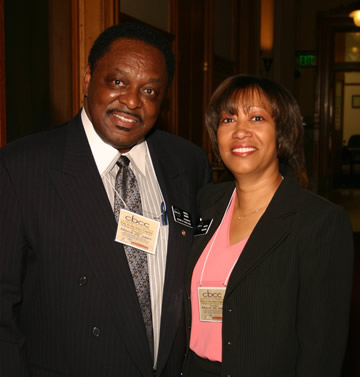
CBCC Chairman Odell Barry and Angela Williams, Chamber Connect Co-chair.
The networking aspect of the program is designed to give participants “exposure to people you just don’t come across in your normal routine, like the mayor and Governor Ritter, people like Tom Clark who runs the Denver Metro Economic Development Corporation, Walter Flemming of Access Connect, and Moses Brewer, VP of African-American Markets at Coors,” Lewis says.
“There is a lot of value for our participants with a strong focus on community and civic involvement.”
“We would like to see our graduates become more successful in their endeavors, and to assume leadership roles throughout the community on nonprofit boards, on city and state boards and commissions, and in leadership programs offered by other organizations and chambers,” Lewis explains. “Linda, Angela and I are very interested in learning more about each other’s programs and how to ensure that our curriculums have as little overlap as possible. AALI is a fantastic and longstanding organization in our community, and it doesn’t make sense for us to duplicate what they can do very effectively. We’re much better off partnering in those areas.”
The program, offered by the African American Leadership Institute, teaches leadership development with a strong emphasis on inner personal work from a spiritual point of view. President Linda Williams says leadership is “the ability to influence without coercion, which means a lot of strategy, a lot of passion and a lot of skill.”
Williams is strong in her conviction that with leadership comes sacrifice. At 45, while working full-time and caring for three grandchildren, Williams carried a full academic load and graduated with a bachelor’s degree in psychology and speech communications from Metropolitan State College. Trudging on without ceasing, two years later she received her master’s degree in counseling psychology and counseling education from the University of Colorado at Denver. She eventually went on to obtain another master’s degree in nonprofit management organization from Regis University.
Williams is a strong proponent for developing authentic leadership, which she says “is about the purpose of understanding leadership styles from an introspective approach. It’s about working with the individual to develop a clear picture of who that individual is by asking and answering questions like “how do you communicate?” and “what is your leadership philosophy?”
“Because there are different types of communication styles and that conflict resolution will always be inevitable for leaders, we teach how communications and business systems work in a corporate environment and how to learn to navigate through those systems,” Williams says.
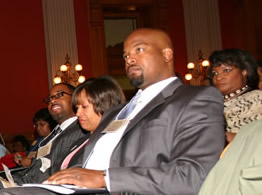
Richard Lewis of RTL Networks, CBCC board member and Chamber Connect co-chair, attends a Chamber Connect event.
The spiritual component of the AALI program involves “looking at something in ourselves that is greater than what is outside of us and how that plays into our leadership roles. We must not separate ourselves from our nature but use it in dealing with human beings,” Williams says.
She clarifies, “If one doesn’t do some of the inner work prior to arriving in an accomplished leadership position, it’s possible to be removed from the people and the issues once in the position.”
Similar to the newer Chamber program, the AALI program lasts 10 months. Participants attend monthly seminars where topics include awakening the leader within, conflict resolution, building strong networks, financial basics and new technology, and leading through influence.
Through collaboration with the Beckwourth Mountain Club, AALI participants also spend a night outdoors in the mountains.
“By taking one out of their comfort zone, they see other types of challenges and learn that what works in one environment may not work in another” Williams says. “It builds teamwork.”
AALI program graduate Crystal Adams, who was in community relations at Coors Brewing Company at the time, says she entered the program because she was fairly new to corporate America and wanted to obtain additional leadership skills. Today, Adams is the manager of foundation and volunteer programs at Qwest.
Her biggest gain from the leadership program was “the opportunity to network with like-minded individuals and that these individuals were people of color who had similar base root concerns about our community and our children, as did I.”
Jeffrey Nickelson was working for the Eden Theatrical Workshop when his employer and AALI alumni, Lucy Walker, recommended he take the program. Nickelson graduated from the program in 1997, and founded the Shadow Theatre Company that same year.
“Contrary to my profession, I am a relatively shy person. As a result of the leadership program, I discovered that by not sharing my ideas in the community in a leadership capacity, that I was not being fully effective in my community,” he says.
Nickelson adds he is a “firm believer that how one develops leaders is to put them in an environment where they have absolutely no control, no knowledge, and where they are forced to find a way to excel as an individual. In that environment, some people will be able to move forward in a leadership capacity, and some will not. The ones that survive are able to excel as human beings and will be a leader in any capacity.”
Michael Hancock, Denver City Council President and representative of District 11, believes leadership”must be approached holistically. It must be approached in such a way that the whole body thrives, not parts individually.”
“When it comes to leadership, it’s about keeping community first, acknowledging other peoples’ contribution to that community, and being inclusive realizing that as the tide rises, the entire community rises,” Hancock concludes.
Return To Top
Williams Resigns from Leadership Institute
AALI President Linda Williams has resigned. After 14 years of service to the organization, Williams says, “I’m 65, and I want to have an opportunity to do several things including pursuing the career I started on when I first started with the institute, which is counseling.”
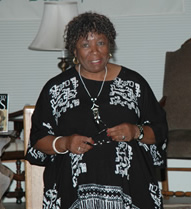 “In working with AALI, I was able to look at the community and see specific needs and I have a strong pull to work with families and children,” she says. “In working with AALI, I was able to look at the community and see specific needs and I have a strong pull to work with families and children,” she says.
The need to counsel is not the only reason Williams resigned, “I have fifteen grandchildren and am going to be a great grandmother, and there are things I want to do with my family so I want to structure my business so I can do that” she says.
Williams started working at AALI in 1994, as secretary to then executive director Dr. Ron Knights. She was promoted to vice president and, when the organization moved from Metropolitan State College to its current location, the then 20-member board voted her president.
At present, AALI has five active board members, but Williams says, “Ideally there should be nine because you need to have committees working on different aspects, like financing and programming, to be sure everything is in place.”
Although board members have not decided who they will recruit and appoint, “What they have decided to do is work through the different aspects of the programs themselves and once they do that, they can look at how to generate enough income to hire someone to serve as president of the institute,” Williams says, adding “They will go through their own strategic process to come to terms with how they want the organization to be run.”
Williams says Board Chairman James Ellis “is an organizer and has an analytical mind that sees where the gaps are and how to fill them. He is also a great writer and brings operational and developmental skills around programming.”
Although not resigning because of financial reasons, Williams says, “We have struggles and I, along with others, have made great sacrifices to be with this organization.”
“But,” she says, “This is no different than many nonprofits that face the same kind of thing. It’s an issue for all nonprofits to keep enough money on board to pay their staff.
She says that if money were the single reason why she were leaving, “I’d have left a long time ago.”
“The organization is not going to fold,” Williams proclaims. “This is just a change as all organizations change their leadership. In this case it is a choice I am making at a time that I think works for both me and the institute.”
“The future for AALI is as bright as it ever was. When I stepped in, I stepped in after someone else and when I leave someone will do the same thing and have the vision to take it to the next level. The success of any organization is determined by how well it continues after people leave,” she says.
Certain that AALI graduates have and are making a difference in the community, aside from contributing to the success of AALI’s youth programs, Williams says, “Every time I go someplace, I’m impressed by the leadership of our grads who are involved in community programs, like Wayne Cauthen. He was Mayor Webb’s chief of staff and he is now city manager for Kansas City. And Alumni Bee Harris is celebrating 20 years of publishing the Denver Urban Spectrum.”
Williams says the adult leadership program is the cornerstone of the organization, and adds, “I think we have some unique opportunities here to take it to its next level.”
She speaks of opportunities with other leadership programs in the Denver Metro area, like the Chamber Connect program, stating, “I don’t think we ever intended for the program to remain the same for its entire existence.”
Williams concludes that, when considering leadership in the community, “It’s far more productive to look at collaboration to be more impactful relative to the issues we’re focusing on. This is a better way to strengthen our numbers.”
photo credit: Foto Fabulous by Roz & Rita
Return To Top |
